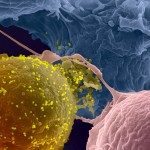Lien vers Pubmed [PMID] – 26468529
J. Virol. 2015 Oct;
Dengue virus (DENV) is the etiological agent of the major human arboviral disease. We previously demonstrated that the TIM and TAM families of phosphatidylserine (PdtSer) receptors involved in the phagocytosis of apoptotic cells mediate DENV entry into target cells. We show here that human CD300a, a recently identified phospholipid receptor, also binds directly DENV particles and enhances viral entry. CD300a facilitates infection of the four DENV serotypes, as well as of other mosquito-borne viruses such as West Nile virus and Chikungunya virus. CD300a acts as an attachment factor that enhances DENV internalization through clathrin-mediated endocytosis. CD300a recognizes predominantly phosphatidylethanolamine (PtdEth) and to a lesser extent PdtSer associated with viral particles. Mutation of residues in the IgV domain critical for phospholipid binding abrogate CD300a-mediated enhancement of DENV infection. Finally, we show that CD300a is expressed at the surface of primary macrophages and anti-CD300a polyclonal antibodies partially inhibited DENV infection of these cells. Overall, these data indicate that CD300a is a novel DENV binding receptor that recognizes PdtEth and PdtSer present on virions and enhance infection.
IMPORTANCE: Dengue disease, caused by dengue virus (DENV), has emerged as the most important mosquito-borne viral disease of humans and is a major global health concern. The molecular bases of DENV-host cell interactions during virus entry are poorly understood, hampering the discovery of new targets for antiviral intervention. We recently discovered that the TIM and TAM proteins, two receptor families involved in the phosphatidylserine (PtdSer)-dependent phagocytic removal of apoptotic cells, interact with DENV particles-associated PtdSer through a mechanism that mimics the recognition of apoptotic cells and mediate DENV infection. In this study, we show that CD300a, a novel identified phospholipid receptor, mediates DENV infection. CD300a-dependent DENV infection relies on the direct recognition of PtdEth and to a lesser extent PtdSer associated with viral particles. This study provides novel insights into the mechanisms that mediate DENV entry and reinforce the concept that DENV uses an apoptotic mimicry strategy for viral entry.
